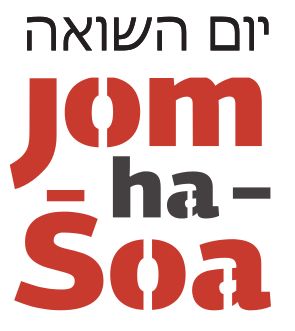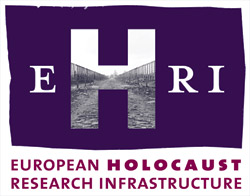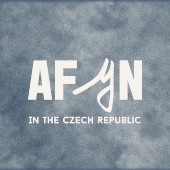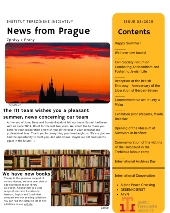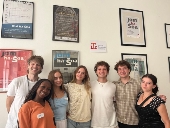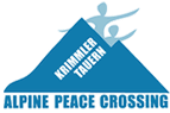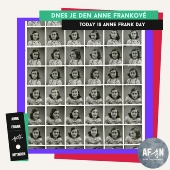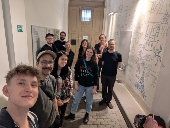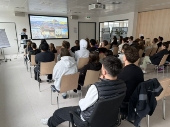Public reading of the names of Holocaust victims - Yom HaShoah
The „Holocaust and Heroism Remembrance Day“, in Hebrew „Yom Hazikaron laShoah ve-LaG‘vurah“ (יום הזיכרון לשואה ולגבורה ) is one of the days of commemoration for the victims of the Holocaust. Initially, it was suggested to hold it on the anniversary of the outbreak of the Warsaw ghetto uprising (14th Nisan/19th of April, 1943), but since this date is very close to Pesach, it was decided to hold it on the 27th Nisan instead. In Israel, this day is a state holiday.
In the Czech Republic Yom HaShoah only gained importance after 1989. At first, commemorative ceremonies were set up for the members of the Jewish community. Those commemorations are held to this very day in Terezín and at Pinkas synagogue in Prague.
In 2006, the Union of Czech Jewish Youth (Česká unie židovské mládeže) started a public ceremony in Prague. Everyone can participate and read out the names of those, who fell victim to racist persecution during WWII. Year by year, more cities from the Czech Republic participate in this form of public commemoration.
Note: Hyperlinks will lead to parts of our website, which may not yet have been translated to English. The pictures and videos you will find there, though, might give you an impression of the commemoration.
Yom HaShoah 2019
In 2019, Yom HaShoah will take place in 21 cities in Czech Republic on May, 2nd. For the first time, there will be a public reading held in Karlovy Vary, Mikulov, Nýrsko Prostějov and Teplice.
Yom HaShoah 2018
Held on April 12th, 2018 in 16 Czech cities: Prague, Brno, Olomouc, Liberec, Sušice, Kolín, Kutná Hora, Plzeň, Havlíčkův Brod, Ústí nad Labem, Klatovy, for the first time in Horažďovice, Lipník nad Bečvou, Mělník, Sedlčany (together with Kosova Hora, participating since 2017) and Ústí nad Orlicí.
Yom HaShoah 2017
Held on April 24th, 2017 in 13 Czech cities: Prague, Brno, Olomouc, Liberec, Sučice, Kolín, Kutná Hora, Plzeň, Havlíčkův Brod, Blatná and, for the first time, in Ústí nad Labem, Kosova Hora and Klatovy.

Yom HaShoah 2016
Public readings of the names of victims of the Holocaust took place on May 5th, 2016, in 11 Czech cities: Prague, Blatná, Brno, Havlíčkův Brod, Kolín, Kutná Hora, Liberec, Liteň u Berouna, Olomouc, Plzeň and Sušice.
Yom HaShoah 2015
On April 16th, 2016, Yom HaShoah took place for the tenth time in Prague, for the second time in Brno, Kolín, Kutná Hora, Liberec, Olomouc and Sušice.
Yom HaShoah 2014
On April 28th, 2014, Yom HaShoah took place for the ninth time in Prague. For the first time, public readings were held also in Brno, Kutná Hora, Liberec, Olomouc and Sušice.
Yom HaShoah 2013
On April 8th, 2013, the 8th public commemoration of victims of the Holocaust took place on náměstí Míru in Prague.
Yom HaShoah 2012
On April 18th, 2012, on náměstí Míru in Prague the names of victims of the Holocaust were read out in public for the 7th time.
Yom HaShoah 2011
The sixth time of public commemoration of the victims of the Holocaust on náměstí Míru in Prague took place on May 2nd, 2011.
Yom HaShoah 2010
April 11th, 2010 on náměstí Míru in Prague.
Yom HaShoah 2009
April 21st, 2009 on náměstí Míru in Prague.
Yom HaShoah 2008
April 30th, 2008 on náměstí Míru in Prague.
Yom HaShoah 2007
April 15th, 2007 on náměstí Míru in Prague.
Yom HaShoah 2006
April 25th, 2006 on náměstí Míru in Prague.
Three weeks have already passed since the International Youth Forum started in South Carolina, hosted by the Anne Frank Center at the University of South Carolina (USC). Our very own Ani from Afyn.cz was one of the delegates. She has shared her reflections on the experience, what she learnt, and what she will take away from it. Read her report to get a glimpse of the IYF 2025!
It's the middle of summer, and we're bringing you the latest issue of our newsletter, News from Prague. We wish you a wonderful rest of your vacation and enjoyable reading.
This week, a group of students from the US (some with Czech family ties) has visited us as part of their summer school in the Czech Republic organised by the Mestenhauser Institute for International Collaboration (MIIC).
Our GEDENKDIENST-Volunteer Laurenz joined the Alpine Peace Crossing (APC) in Krimml to cross the Austrian Alps in remembrance of the thousands of Jews who fled the antisemitism that was still rampant in Europe after 1945. Laurenz welcomed the team to Jachymka a few weeks ago.
Yesterday we celebrated Anne Frank's legacy in a creative way by showcasing the artworks submitted by talented contributors at Žižcafé Therapy.
On Saturday our GEDENKDIENST volunteer Laurenz welcomed the team of the Alpine Peace Crossing to Jachymka to show them our work.
Alpine Peace Crossing (APC) is an Austrian organization based in Krimml (Salzburg province).
Our Volunteer Laurenz was in Austria last week to promote the GEDENKDIENST program at his former school, the HAK 1 in Salzburg. Speaking to about 60 people from the 4th grade he talked about his experiences and encouraged the students to also use the opportunity to do a Gap-Year with a positive impact. Besides the remembrance work and the work and history of our institute, Laurenz told the students about the challenges and the many wonderful things that come with moving abroad and starting a new job fresh out of school.
We want to thank the HAK 1 business school in Salzburg for giving Laurenz the opportunity to promote the program and the students for their keen interest.


